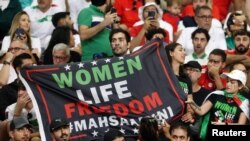On day two of the World Cup in Qatar, Iran’s turmoil from a two-month long protest movement against Islamist rule was apparent among Iranian fans in the stadium as their men’s football team slumped to a 6-2 loss to England.
A VOA Persian reporter who was at Monday’s first match of the tournament for Iran and England at Doha’s Khalifa International Stadium estimated a crowd of 20,000 to 25,000 Iranian fans among the 45,300 people in attendance.
Most of those Iranian fans were loyalists of Iran’s Islamist government which got them free tickets for the match and encouraged them to make the short journey to nearby Qatar, the reporter observed. Those fans engaged in some chanting for Iran to win the match and waved the Islamic republic’s official flag.
The reporter also observed two other smaller groups of Iranians at the stadium, both supportive of Iran’s nationwide anti-government protests that began in mid-September.
One of those groups included Iranians who were big football fans and traveled to Doha from North America and Europe and from Iran itself. Some had bought tickets many months ago, prior to the outbreak of the protests.
The reporter said members of that group of Iranian fans told him they had hoped the Iranian team would have shown more solidarity with protesters in their home country. Demonstrators have been protesting mostly peacefully for an end to Iran’s 43-year theocracy in the face of a brutal government crackdown.
The Iranian players appeared to make a gesture of solidarity toward the protesters when they declined to sing the Islamic republic’s anthem before the kickoff with England. Their silence followed similar refusals by Iranian athletes competing in other sports to sing the anthem in recent weeks.
On Sunday, Iranian football team captain Ehsan Hajsafi also expressed sympathy for “bereaved families” in his country.
“We have to accept the conditions in our country are not right and our people are not happy,” he said. “We are here, but it does not mean we should not be their voice, or we should not respect them.”
But for some of the Iranian fans at the stadium, the captain’s words and the team’s abstention from singing the anthem did not go far enough. The reporter said those fans wanted the players to make other gestures like kneeling down at the start of the match or wearing special wristbands, although World Cup organizer FIFA has barred players from wearing any wristbands besides those it approved.
The players’ perceived lack of stronger solidarity with the protesters left those fans disappointed with the team and pleased with its defeat, the reporter said.
The reporter said a second group of Iranian supporters of the protest movement, numbering several thousand, came to the stadium mainly to engage in acts of protest themselves and to amplify the voices of their compatriots in Iran. He observed authorities stopping some of those Iranians from bringing Iran’s pre-1979 flag into the stadium and ordering them to remove shirts with protest slogans.
Despite those measures, images shared on social media showed some Iranians in the stands defiantly booing the national anthem, wearing shirts and holding signs with the protest slogan “Woman. Life. Freedom,” and holding Iran’s Islamic republic flag with its emblem cut out.
One clip showed a woman parading the lion and sun flag of Iran’s pre-1979 monarchy, prompting Reza Pahlavi, the U.S.-based son of Iran’s last shah, to share the video on his Twitter feed.
After the match, some Iranians leaving the stadium were seen in a social media video chanting for the “death” of Iranian Supreme Leader Ayatollah Ali Khamenei, echoing a chant of many protesters in Iran. The video was posted by a U.S.-based Iranian activist with the pseudonym Vahid Online.
Similar chants were heard in videos that appeared to be filmed in the Iranian capital, Tehran, after Monday’s match. VOA could not independently verify those images because it is barred from reporting inside Iran.
One video posted by U.S.-based Iranian-American activist and VOA Persian TV host Masih Alinejad showed a residential street in Tehran, with Iranians inside their homes shouting and responding to each other with chant: “six, six, six goals” — the number of goals Iran conceded to England.
The Iranian team’s Portuguese manager, Carlos Queiroz, told a post-match news conference that all Iranians have a right to express pleasure or displeasure with its performance. But he said those Iranians who came to “disturb” his young players with “issues that are not only about football opinions” were “not welcome” in the stadium.
“You don’t even imagine behind the scenes what these kids they have been living [through] in the last few days just because they want to play football, just because they want to express themselves as footballers,” Queiroz said. “Whatever they do or whatever say, they want to kill them ... So, they only have one hope, which is [to] let them represent the country and play for the people.”
VOA’s reporter at the stadium said some Iranians with whom he spoke rejected Queiroz’s call for them to stay away. Those fans told him that they planned to be at Qatar’s Ahmad bin Ali Stadium for Iran’s next match against Wales on Friday, gathering outside and being as loud as they can be in order to bring attention to Iran’s violent suppression of the protest movement.
Ali Emadi reported from Doha and Rozita Azizi Namini reported from Washington.




